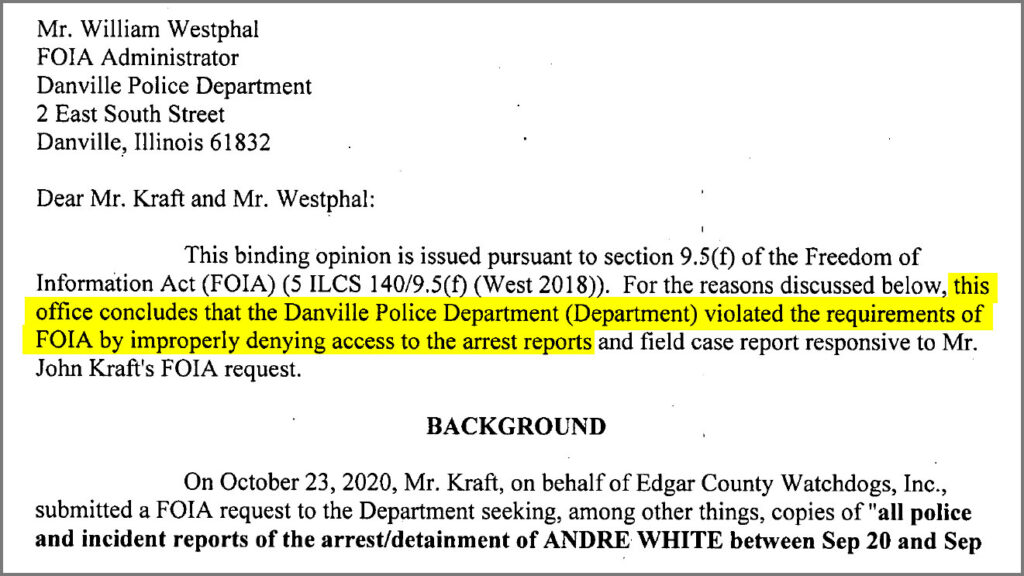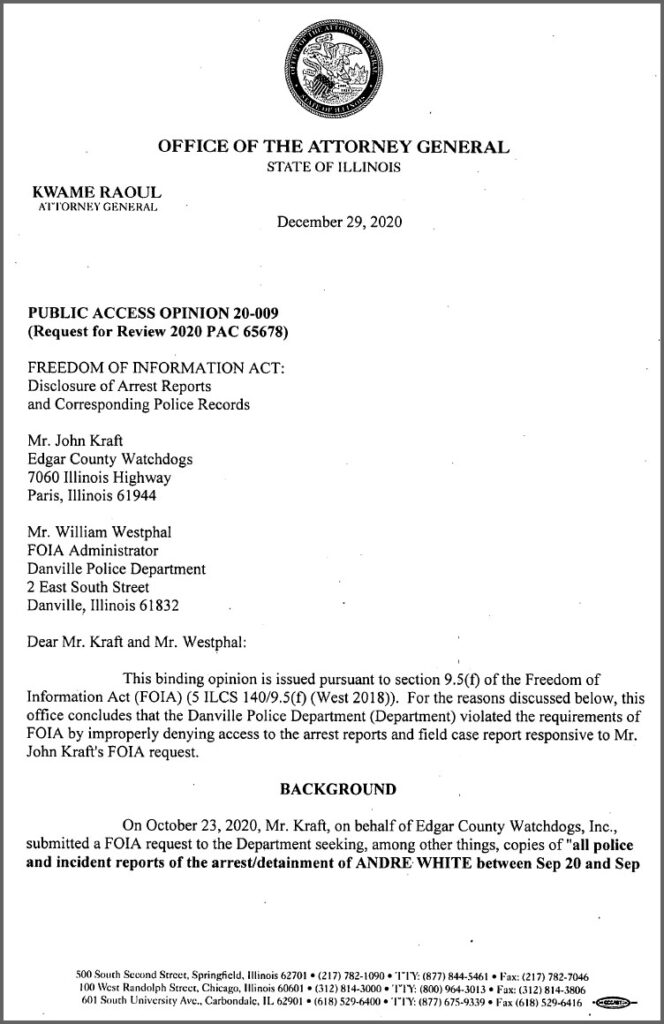
On December 29th, 2020, the Office of the Attorney General of Illinois issued a determination on a Freedom of Information Act dispute regarding Danville Police Department records. Chief Deputy Attorney General Brent Stratton declared that Danville violated FOIA by denying access to arrest reports and a field case report related to a prisoner who died shortly after leaving the Danville jail.
Stratton issued his determination in a binding opinion letter, one of only seven such binding FOIA determinations issued throughout the state during 2020. Binding opinions are rare, and are often cited by attorneys and judges if FOIA disputes go to court.
The FOIA request sought records related to Andre White, who was arrested on September 25th for speeding, marijuana possession, and driving without insurance or license. White was released from jail around 1:30am on September 26th, and found dead less than a half mile from the jail at 5:30am. Serious questions have been raised about what led to White’s death, including the possibility that his body was “dumped” in the location where it was found.
The request was submitted by John Kraft of Paris, IL on October 23rd, but Danville’s FOIA Administrator, William Westphal denied the records, claiming that there was pending prosecution. Kraft argued that because Mr. White was deceased, he could not be subject to law enforcement proceedings, and eventually submitted a request for review to the Illinois Attorney General (IAG).
The IAG went back to the very basics of FOIA:
“Section 1 of FOIA ( 5 ILCS 140/ 1 ( West 2018)) declares that “it is the public policy of the State of Illinois that access by all persons to public records promotes the transparency and accountability of public bodies at all levels of government.” Under FOIA, [a]ll records in the custody or possession of a public body are presumed to be open to inspection or copying. Any public body that asserts that a record is exempt from disclosure has the burden of proving by clear and convincing evidence that it is exempt.” 5 ILCS 140/1. 2 (West 2018). Bare assertions without a detailed rationale do not satisfy a public body’s burden of proving that exemptions are applicable. Rockford Police Benevolent and Protective Ass’n v. Morrissey, 398 Ill. App. 3d 145, 150-51 (2d Dist. 2010). Rather, “[t]he public body satisfies its burden when it provides a detailed justification for the claimed exemption which addresses the specific documents requested and allows for adequate adversarial testing.” Turner v. Joliet Police Department, 2019 IL App (3d) 170819, ¶ 10, 123 N.E. 3d 1147, 1150 (2019).”
And after some analysis, issued their determination:
“The Department’s responses to Mr. Kraft and to this office set forth no facts indicating that disclosure of the arrest report information enumerated in items ( iii) through ( vi) of section 2. 15( a) would interfere with pending or actually and reasonably contemplated law enforcement proceedings conducted by any law enforcement agency. Standing alone, statements that there are pending charges and the possibility or likelihood of upcoming trials for two of the arrestees are insufficient bases upon which to withhold the information referenced in sections 2. 15( a)( iii) through 2. 15( a)( vi) for any of the three arrestees, as the Department did not explain how or why the disclosure of that information would interfere with the prosecution. Therefore, the Public Access Bureau concludes that the Department did not sustain its burden of proving by clear and convincing evidence that the three responsive arrest reports are exempt from disclosure.”
“Therefore, it is the opinion of the Attorney General that the Danville Police Department violated the requirements of FOIA by denying the arrest reports and field case report responsive to Mr. Kraft’s Freedom of Information Act request. Accordingly, the Department is hereby directed to take immediate and appropriate action to comply with this opinion by providing Mr. Kraft with copies of the arrest reports and field case report responsive to his October 23, 2020, FOIA request.”
For a detailed account, read the entire nine page determination letter here (click for PDF):

